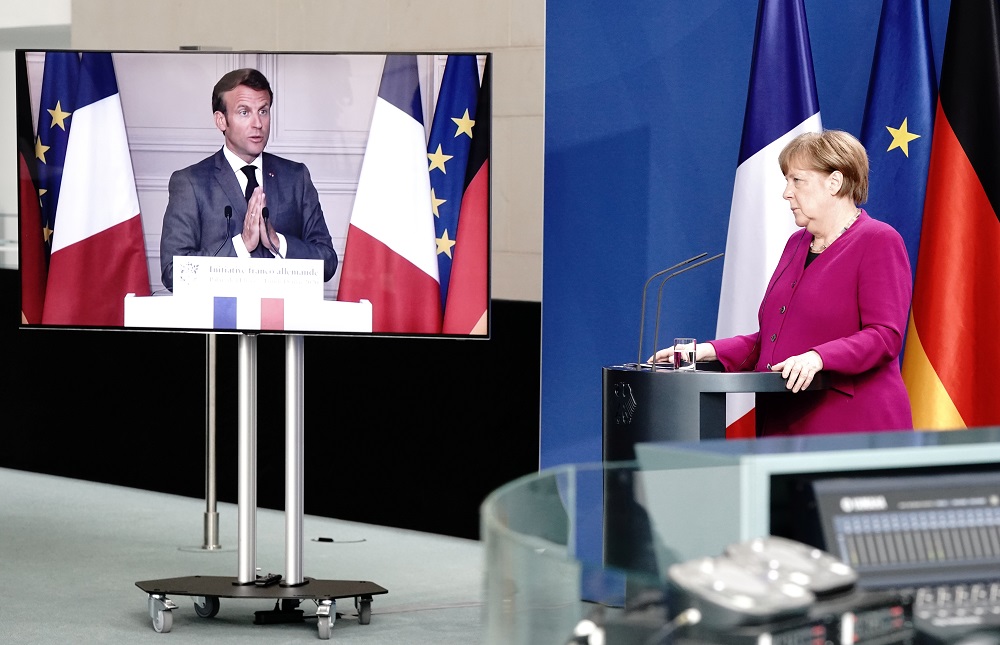New EU recovery fund hatched for members


Germany, France float $547b pot, but face resistance within bloc over grants
BERLIN/PARIS-The leaders of Germany and France agreed on Monday on a one-off 500 billion-euro ($547 billion) fund to help the European Union recover from the coronavirus pandemic, a proposal that would add further cash to an arsenal of financial measures the bloc is readying to cope with the outbreak's economic fallout.
Following a video call, German Chancellor Angela Merkel and French President Emmanuel Macron said the plan would involve the EU borrowing money in financial markets to help sectors and regions that are particularly affected by the pandemic.
Crucially, the money would be disbursed in the form of grants rather than loans, with repayments made from the EU budget, an unprecedented proposal that overcomes long-standing objections in Berlin to the notion of collective borrowing.
"Because of the unusual nature of the crisis we are choosing an unusual path," Merkel said.
Macron said the proposal was a way "to make Europe move forward".
"We must draw all lessons from this pandemic," he said, insisting on the need for "solidarity "between EU member states.
They also agreed to raise research and development capacities in the field of COVID-19 vaccines and treatments, set up joint strategic stocks of pharmaceutical and medical products, and increase the production capacities of these products in the EU.
Macron acknowledged that a French-German deal alone "doesn't mean an agreement from the 27". The EU's executive body would make its own proposal to EU member states and "we hope that the French-German deal will help", he said.
European Commission President Ursula von der Leyen welcomed the proposal. "It acknowledges the scope and the size of the economic challenge that Europe faces, and rightly puts the emphasis on the need to work on a solution with the European budget at its core."
Concerns remain
There have been concerns in some countries that the pandemic and the bloc's initial uncoordinated response to it could boost anti-EU sentiment in member states.
Merkel said it was important to ensure that all EU countries could respond to the economic challenge "and that requires this unusual, one-off effort that Germany and France are now prepared to take".
"The goal is for Europe to emerge from the crisis stronger," she said.
National parliaments of EU members will have their say on the proposal, which is also likely to run into strong resistance from fiscal hawks in the bloc.
Austrian Chancellor Sebastian Kurz said his country remained opposed to the idea of grants.
"Our position remains unchanged," Kurz wrote on Twitter. "We are ready to help most affected countries with loans. We expect the updated (EU's seven-year budget framework) to reflect the new priorities rather than raising the ceiling."
Dutch Finance Ministry spokesman Jaap Oosterveer said the ministry was studying the plan and had no immediate comment.
Merkel expressed cautious optimism, however, that the agreement between Berlin and Paris would win widespread support.
"I believe that if Germany and France send a signal, that's something which encourages the quest for consensus in Europe," she said.
Italian Prime Minister Giuseppe Conte called the proposal "a first, important step in the direction hoped for by Italy".
But he added in a Facebook post on Monday evening: "To overcome the crisis and to help businesses and families, the #RecoveryFund needs to be broadened." He described himself as "confident of an ambitious proposal by@EU_Commission".
So far, EU countries engage in only limited common borrowing, for instance through the European Investment Bank and the union's bailout fund for crisis-hit governments, the European Stability Mechanism, but require eventual repayment by member states.
Macron and Merkel agreed that spending from the recovery fund would focus on areas that would benefit most from future investment, including digitalization, the green economy and pandemic resilience in the health sector.
Agencies - Xinhua






























